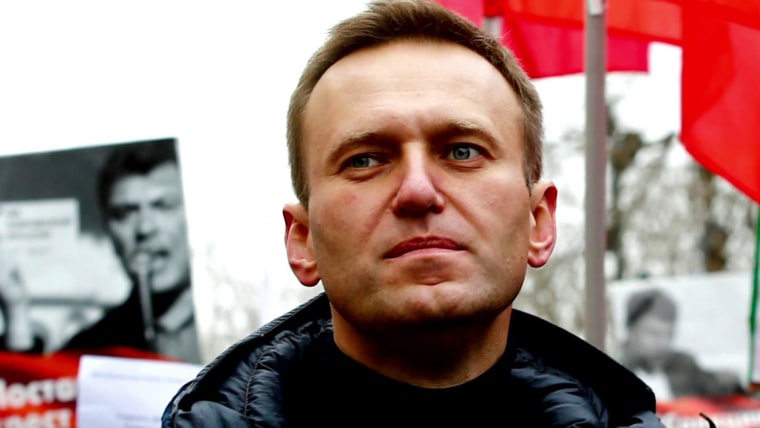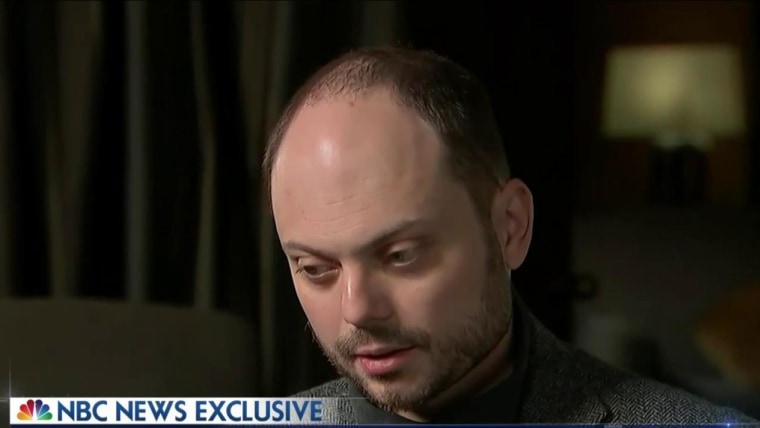As fierce Kremlin critic Alexei Navalny lies in a coma after he was allegedly poisoned by a chemical nerve agent, international pressure is growing on Russia to explain how chemical weapons came to be used against the country's most prominent opposition politician.
According to a statement from the German federal government Wednesday, Navalny was sickened with Novichok — a group of advanced nerve agents developed by the Soviet military in the 1970s and the 1980s — also used in an attempt to kill a former Russian spy in the United Kingdom in 2018.
Speaking at a press conference Thursday, German Chancellor Angela Merkel said she stood by her description of Navalny's poisoning as an "attempted murder" and an "attempt to silence him."
Navalny fell severely ill on a Russian flight last month, and was later transported from a hospital in Omsk, Siberia, to Germany for treatment at his family's request.
The White House National Security Council called Germany's findings on Navalny "completely reprehensible," the European Union said it was essential that Russia investigate the incident thoroughly, while British Prime Minister Boris Johnson called the alleged use of Novichok "outrageous" on Twitter.
French Foreign Minister Jean-Yves Le Drian also condemned the “irresponsible” use of a nerve agent, saying the principle of prohibiting the use of any chemical weapon has been violated.
However, Russia has been steadfast in its response. Foreign ministry spokesperson Maria Zakharova said the accusation that Novichok was used was yet another “informational campaign against Russia,” the state-run news agency Tass reported Wednesday.
During his daily briefing with reporters Thursday, Kremlin spokesperson Dmitry Peskov reiterated that Berlin has yet to provide specific information about Navalny's test.
"We are definitely interested in establishing the reasons for what happened to the Berlin patient,” Peskov said, referring to Navalny. Russian officials tend to avoid mentioning the opposition politician by his last name. Peskov also said Russian President Vladimir Putin and Merkel have had no contact since the announcement of the German government's findings.
Peskov repeated Russian claims Wednesday that no toxins were found in Navalny's system in hospital tests before he left Russia.
Meanwhile, the head of Russia's foreign intelligence agency, Sergei Naryshkin, said Thursday that Moscow could not exclude that Western special forces were behind the poisoning, Russia's RIA news agency reported.
Embattled Belarusian President Alexander Lukashenko, who clings to power despite more than three weeks of protests against his disputed election victory, supported this theory and said Belarus intercepted a chat between Warsaw and Berlin suggesting that Navalny’s poisoning was a falsification, although he provided no evidence.
“They have done it, and I quote, to make Putin not want to stick his nose into Belarus affairs," Lukashenko said in a meeting with Russian Prime Minister Mikhail Mishustin on Thursday.
Putin has supported Lukashenko during the post-election turmoil, offering military support if required.
Lukashenko did not specify who the parties were in the alleged communication between Warsaw and Berlin.
The news of Navalny's alleged poisoning appears to be the latest in the long string of Kremlin opponents who have been poisoned or succumbed to mysterious illnesses.
The most high profile of these attempts involved Sergei Skripal, a former Russian military spy turned double agent, and his daughter, Yulia, who were also poisoned with Novichok in Salisbury, England, two and a half years ago.
They both survived the attack, but a British citizen who had accidental exposure to the nerve agent later died.
British officials blamed the incident, which had further soured Russia’s relationship with the West, squarely on the country's military intelligence service. The Kremlin has denied any involvement in the Skripal case.
Fourteen years ago, former KGB agent and an outspoken critic of Putin, Alexander Litvinenko, died in London after drinking green tea laced with polonium-210, a potent radioactive isotope.
A British inquiry in 2016 found that Putin "probably" personally sanctioned Litvinenko’s murder. The Kremlin has denied any involvement.
Download the NBC News app for breaking news and politics
Prominent journalist Anna Politkovskaya was also reportedly poisoned in 2004 — two years before being fatally shot in her Moscow apartment building. Politkovskaya said she fell severely ill and lost consciousness after drinking a cup of tea. She said she was deliberately poisoned to prevent her from covering the 2004 seizure of a school in southern Russia by Islamic separatists.
The Russian opposition activist and Kremlin critic Vladimir Kara-Murza said he believes attempts were made to poison him in 2015 and 2017 because of his political activity.
“I can only presume that this was done by people with at least connections to the Russian special services,” he told NBC News in 2017.
The Kremlin has not commented on Kara-Murza’s alleged poisoning.
Navalny himself had a previous suspected poisoning last year when he was rushed to a hospital from prison where he was serving a sentence following an administrative arrest. Doctors then said he had a severe allergic attack and discharged him back to prison the following day.
Like Navalny, the anti-Kremlin activist Pyotr Verzilov was also flown to Germany after suspected poisoning in 2018. At the time, doctors treating him said a poisoning was “highly plausible.”
His associates said Verzilov, publisher of an independent Russian online news portal with close ties to the outspoken activist group Pussy Riot, was poisoned in an assassination attempt or as a means of intimidation.
The Kremlin did not comment on Verzilov’s suspected poisoning.
Carlo Angerer, Reuters and The Associated Press contributed.
World - Latest - Google News
September 03, 2020 at 09:31PM
https://ift.tt/3gVRBJm
Pressure grows on Moscow as Navalny becomes latest opponent to be allegedly poisoned - NBC News
World - Latest - Google News
https://ift.tt/2SeTG7d
Bagikan Berita Ini

















0 Response to "Pressure grows on Moscow as Navalny becomes latest opponent to be allegedly poisoned - NBC News"
Post a Comment